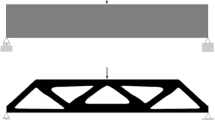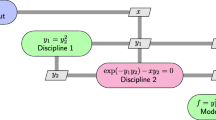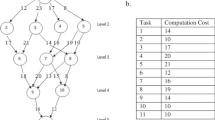Abstract
The conceptual design of a rotorcraft system involves many different analysis disciplines. The decomposition of such a system into several subsystems can make analysis and design more efficient in terms of the total computation time. Adaptive parallel decomposition makes the structure of the overall design problem suitable to apply the multidisciplinary design optimization methodologies and it can exploit parallel computing. This study proposes a decomposition method which adaptively determines the number and sequence of analyses in each sub-problem corresponding to the available number of processors in parallel. A rotorcraft design problem is solved and as a result, the adaptive parallel decomposition method shows better performance than other previous methods for the selected design problem.
Similar content being viewed by others
Abbreviations
- N:
-
The number of sub-problems
- Nt:
-
The total number of analyses
- pi :
-
Thei-th analysis module
- pi k :
-
The z’-th analysis ink-th sub-problem
- nk :
-
The number of analyses ink-th sub-problem
- U, CL :
-
The amount of information transferred between sub-problems in upper and lower triangular regions
- bk :
-
The sum of feedback couplings of thek-th sub-problem
References
Altus, S. S., KrI. M. and Gage, P. J. 1995, “A Genetic Algorithm for Scheduling and Decomposition of Multidisciplinary Design Problems,”Advances in design automation, ASME paper 95–141.
Gen, M. and Cheng, R. 1997,Genetic Algorithms and Engineering Design, pp. 234–248.
Kusiak. A. and Wang, J. 1993, “Decomposition of the Design Process,”ASME Journal of Mechanical Design, Vol. 115, pp. 687–695.
Michelena, N. F. and Papalambros, P. Y. 1994, “A Network Reliability Approach to Optimal Decomposition of Design Problems,”Advances in Design Automation, ASME, New York Vol. 2, pp. 195–204.
Park. H. W., Kim, M. S., Choi, D. H. and Mavris, D. N., 2002, “Optimizing the Parallel Process Flow for the Individual Discipline Feasible Method,”9th AIAA/ISSMO Symposium and Exhibit on Multidisciplinary Analysis and Optimization, September 4–6.
Park, H. W., Kim, M. S., and Choi, D. H. 2003, “A System Decomposition Technique Using a Multi-Objective Genetic Algorithm.”KSME, Vol. 27. No. 4, pp. 499–506.
Park. H. W. 2003, “A Parallel Decomposition Method for Multidisciplinary Design Optimization Based on a Multiobjective Genetic Algorithm.” Ph. D. Thesis, Hanyang University, School of Mechanical Engineering.
Rogers, J. L. and Barthelemy, J. -F. M.. 1992, “Enhancements to the Design Manager's Aid for Intelligent Decomposition (DeMAID),”AIAA paper No. 92–4809.
Rogers. J. L.. and Bloebaum, L. 1994, “Ordering Design Tasks Based on Coupling Strength,”AIAA paper No. 94–4362.
Rogers, J. L., McCulley, M. and Bloebaum, L. 1999, “Optimizing the Process Flow for Complex Design Projects,”Design Optimkation: International Journal for Product & Process Improvement, Vol. 1, No. 3, pp. 281–292.
Vanderplaats, G. N. 1995,DOT Users Manual Version 4.20, Vanderplaats Research & Development, Inc.
Author information
Authors and Affiliations
Corresponding author
Rights and permissions
About this article
Cite this article
Park, HW., Lee, S.J., Lee, HS. et al. Adaptive parallel decomposition for multidisciplinary design. KSME International Journal 18, 814–819 (2004). https://doi.org/10.1007/BF02990300
Received:
Revised:
Issue Date:
DOI: https://doi.org/10.1007/BF02990300




